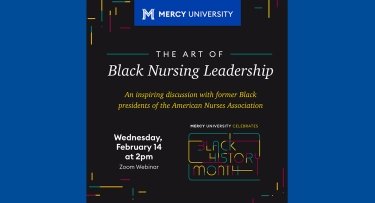Mercy Hosts Black History Month Discussion Featuring Three Pioneering Nursing Leaders

In honor of Black History Month, Mercy University hosted The Art of Black Nursing Leadership, a virtual panel discussion with three pioneering nursing leaders who have made significant contributions to the profession through policy, education and advocating for the rights of all nursing professionals.
Moderating the February 14 webinar were Dr. Kenya Beard, dean of the Mercy University School of Nursing, Dr. Wrenetha Julion, Rush University School of Nursing, and Drs. Ashley Graham-Perel and Kelly Bryant from the Columbia University School of Nursing.
Featured speakers were Dr. Barbara Nichols, the first Black woman president of the American Nursing Association (ANA); Dr. Beverly Malone, President and CEO of the National League for Nursing and a past president of ANA; and Dr. Ernest Grant, vice dean of the Office of Diversity, Equity, Inclusion, and Belonging at Duke University School of Nursing and past president of the ANA. Prompted by questions from the audience and the co-moderators, the three shared insights based on their experiences, describing the professional and societal obstacles they faced over the years, and expressing their vision for more diversity and inclusion in the nursing profession.
Nichols, who contributed to the 2021 Future of Nursing report published by the U.S. National Academy of Medicine, described the challenges and frustrations she faced in her early career. “Never forget that leadership is both a privilege and an opportunity to learn and grow, personally and professionally,” she said.
Malone, appointed by President Bill Clinton to the commission charged with developing the Patient Bill of Rights, highlighted the importance of collaboration and “daring ingenuity” in creating strategies that can change the landscape of nursing and patient care.
Grant cited the extraordinary strides the profession has made, while acknowledging the need to continue adapting to new generations. “It was a pivotal moment in nursing history when the ANA appointed a Commission to Address Racism in Nursing,” he said, referring to a decision-making body that included Beard. “And it continues to move the profession forward to this day.”
Beard applauded the speakers for establishing what she called “a model platform and an escalator for career progression. But where does nursing go from here to ensure a more inclusive profession?” She was answered by Malone, who said, “We’re not where we need to be, but we keep pushing that envelope. In fact, I expect every person on this call to put their shoulder to the wheel to help move it forward. If we push together, we can succeed.”

